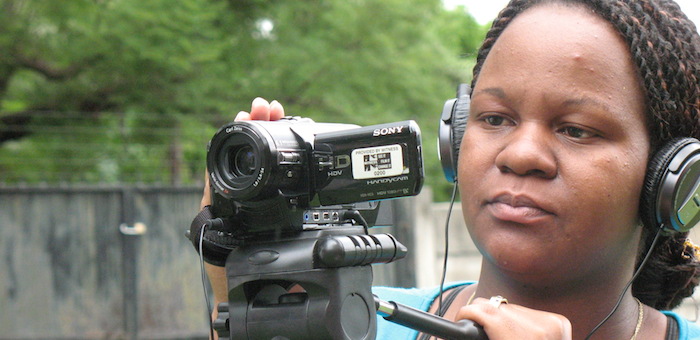Exposing Gender-Based Violence in Zimbabwe
Senior Program Manager Bukeni Waruzi first met Zimbabwean human rights defender Kuda Chitsike at a WITNESS video advocacy training in South Africa in 2008. As a lawyer with The Research and Advocacy Unit (RAU), an independent institute in Zimbabwe, Kuda was eager to learn how RAU could turn their lengthy written reports on politically motivated gender-based violence into videos to pressure citizens to action.
This meeting was the beginning of a multi-year partnership between WITNESS and RAU. Since 2000, sexual violence has been used as a weapon by a number of Zimbabwean political parties to repress political dissent, intimidate political opponents and incur psychological damage. While working together RAU and WITNESS created a number of video advocacy pieces featuring the stories of survivors of physical and sexual violence. For each video, WITNESS worked with Kuda and her team to produce a Video Action Plan, a process designed to help activists think through messaging, how to reach their target audience and how to tell the story most effectively.
RAU and WITNESS took great precaution and care to ensure the safety of the survivors filmed in the project. They went through a rigorous process of obtaining informed consent, ensuring that participants fully comprehended the purpose and implications of the interview and the video as a whole. They also protected the subjects’ identities while filming to minimize the risk of retaliation against the survivors and themselves.
Kuda remembered, “People were scared to support us at first, as the issue of political, let alone sexual violence is a sensitive issue. And it’s understandable, because a lot of people within NGOs [in Zimbabwe] have been beaten up and arrested for programs that were regarded as political.” Regardless, the women involved knew that the stories must be told, “and if we get arrested, so be it,” said one survivor.
When the videos were completed, RAU traveled to communities throughout the country, hosting screenings, spreading wider awareness and encouraging education and discussion. As Kuda noted, “Using a written report, we’re already cutting off people who can’t read. If you can go into a village and just show a video, people can start to engage on the issues.”
Following one screening a woman stood up and shared that she had been the victim of politically motivated sexual violence. The woman had thought that her case was an isolated incident. Kuda explained how cases like this showed her how the videos helped the women themselves by giving them a way to reclaim their voice and heal. For many of the women who appeared in the videos, sharing their stories was a positive opportunity to talk about their traumatic experiences, often for the first time.
RAU’s videos were able to reach an even larger audience online, demonstrating the power of video to tell universal stories that resonate across cultures, languages, political backgrounds, and literacy rates.
Kuda sees visible results of the videos everyday. Leading up to the 2013 election, many anticipated that there would be a resurgence of violence, including sexual assault. But that wasn’t the case. Kuda attributed this to greater attention and vigilance surrounding the issue, stating, “they [potential perpetrators] knew that if they used sexual violence again, it would be out in the open.”
Since their training sessions with Bukeni and other WITNESS staff, RAU has produced three videos on their own. Kuda and RAU are now focusing on child marriage, another prevalent issue that is not widely discussed in Zimbabwe. Kuda has already started thinking about her Video Action Plan.
Image from 2010 WITNESS training with RAU in Zimbabwe

